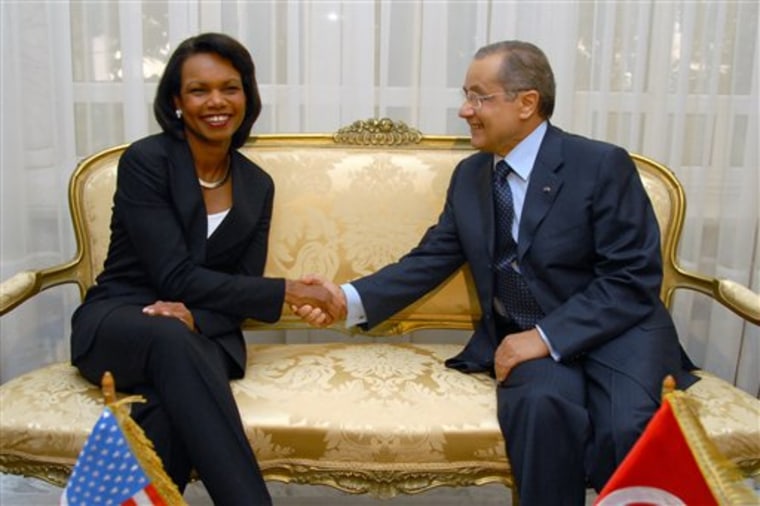Secretary of State Condoleezza Rice held meetings Saturday with terrorism-fighting allies in North Africa, a region of growing strategic importance.
After talks with Foreign Minister Mourad Medelci in this vital oil- and gas-producing nation, Rice planned to see President Abdelaziz Bouteflika.
Her visit comes as Algeria has experienced a surge in terrorist attacks, most claimed by a local extremist group that has linked with al-Qaida.
Earlier Saturday on her three-day visit to North Africa, she pressed for democratic changes in neighboring Tunisia in a meeting with President Zine El Abidine Ben Ali. "We talked about internal matters here in Tunisia and about the course of reform," Rice said after the discussions in Tunis, the capital.
She said she had a lengthy discussion with Ben Ali, who has held power since a bloodless palace coup in 1987 and won several landslide electoral victories tainted by charges of fraud. He is expected to run for a fifth term next year.
"There have been some political reforms," Rice later told reporters on her flight to Algiers. But, she added, "we have been very clear that we would hope that Tunisia would do more."
She said she hoped "media access, freedom of the Internet, access to the television for the opposition will really be enshrined" in the lead-up to the 2009 election. "Because, while the election day is important, it's also the run-up to the election that makes it free and fair," she said.
Criticisms toward Tunisia
In a statement Friday, the U.S.-based Human Rights Watch called on Rice to urge the Tunisian government to "end its harassment and imprisonment of human rights activists."
Rice said the U.S. and Tunisia were "good friends" and that she had had "very good discussions about internal and external matters," including "the circumstances here in the region in terms of security and counterterrorism."
Rights groups frequently criticize Tunisia for tightly controlling the media and trampling civil liberties, though this tourist-friendly and relatively liberal Muslim country is also praised for promoting women's rights and economic reform.
"I do want to say that the extraordinary role of women in Tunisia is something I raised" with the president, Rice said. "Women have made great progress here."
In Algeria, Rice was greeted at the airport by Medelci. After later talks with the president, she was to share with him the "iftar" — a traditional Muslim dinner that breaks the day's fast observed during the holy month of Ramadan. Rice then was to go to Morocco.
Increase in violence
Algeria, a strong U.S. ally in the fight against terrorism, has seen a surge of violence since 2006 when a resurgent extremist group left over from a civil war in the 1990s affiliated itself with Osama bin Laden's network under the name al-Qaida in Islamic North Africa.
More than 100 Algerians were killed in the violence in August alone, according to an Associated Press count.
Rice on Friday became the first secretary state to visit Libya in over 50 years, meeting with leader Moammar Gadhafi.
The United States considers Gadhafi reformed since his surprise decision in 2003 to renounce terrorism and give up weapons of mass destruction. His government has also agreed to resolve legal claims from the bombing of Pan Am Flight 103 and other alleged terror attacks that bore Libyan fingerprints.
Rice's visit comes amid a surge in interest from U.S. companies, particularly in the energy sector, to do business in Libya, where European companies have had much greater access in recent years.
Libya's proven oil reserves are the ninth largest in the world, close to 39 billion barrels, and vast areas remain unexplored for new deposits. Algeria is estimated to hold the world's 14th largest oil reserves and is a major natural gas exporter.
